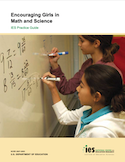Girls in Math & Science
Explore resources designed to support girls' success in math and science. 
- View a visual diagram of all five practices
- Watch a topic overview and download planning templates
- Listen to an expert
Explore the subtopics below to learn more about the recommended practices:
- Ability is Expandable
- Prescriptive Feedback
- Female Role Models
- Sparking Curiosity
- Teaching Spatial Skills
To learn more about the research underlying these practices, view the IES Practice Guide, Encouraging Girls in Math and Science.
- Items 49 - 60 of 69
Sort by:
Two Mindsets
Girls in Math & Science > Ability is Expandable > See How It Works
Nigel Holmes designed this diagram, based on the research of Carol Dweck, to describe how students with growth and fixed mindsets may respond to challenges, successes, failure, and criticism in...
Resource Type
Sample Material
Spatial Skills Training Lesson Planner
Girls in Math & Science > Teaching Spatial Skills > Overview & Tools
Use this planning tool to help teachers explore ideas for spatial skills training in the classroom.
Resource Type
Tool
Teacher Self-Reflection: Spatial Skills Training
Girls in Math & Science > Teaching Spatial Skills > Overview & Tools
Use this assessment tool to guide teachers' self-reflection on instructional strategies for teaching spatial skills.
Resource Type
Tool
Learning Together About Providing Spatial Skills Training
Girls in Math & Science > Teaching Spatial Skills > Overview & Tools
These activities can be used to convene a school in-service session for teachers to learn why and how to teach students spatial skills. Related Media: Teaching Spatial Skills to Girls...
Resource Type
Tool
Learning Together About Female Role Models
Girls in Math & Science > Female Role Models > Overview & Tools
Use this protocol to convene a school in-service session to learn about the practice of exposing girls to female role models who have achieved success in math or science. Related Media and...
Resource Type
Tool
Designing Math and Science Lessons to Spark Girls' Curiosity
Girls in Math & Science > Sparking Curiosity > Overview & Tools
Use the tips provided in this tool to organize the integration of fun math and science activities for girls into the math/science curriculum, and to connect students to additional enrichment...
Resource Type
Tool
Conducting a School Assessment: Sparking Curiosity
Girls in Math & Science > Sparking Curiosity > Overview & Tools
Use this assessment worksheet to examine the degree of school support for sparking interest in math and science, and to identify areas for improvement.
Resource Type
Tool
Teacher Self-Reflection: Strategies for Sparking Curiosity
Girls in Math & Science > Sparking Curiosity > Overview & Tools
This evaluation form can be used to guide teachers’ self-reflection on instructional strategies for sparking initial curiosity and fostering long-term interest in math and science.
Resource Type
Tool
Learning Together About Sparking Curiosity
Girls in Math & Science > Sparking Curiosity > Overview & Tools
Convene a school in-service session for teachers and use this protocol to learn strategies for sparking initial curiosity and fostering long-term interest in math and science. Related...
Resource Type
Tool
Learning Together About Academic Abilities (Part 1)
Girls in Math & Science > Ability is Expandable > Overview & Tools
Convene a school in-service session about how teachers can help students develop accurate and positive perceptions of math and science abilities using these suggested activities. Related Media and...
Resource Type
Tool
Planning for Implementation: Female Role Models
Girls in Math & Science > Female Role Models > Overview & Tools
Work with teachers in your school using this tool to develop a plan for exposing your students to female role models in math and science. Related Files: Teacher Self-Reflection: Teaching...
Resource Type
Tool
Teacher Self-Reflection: Teaching About Female Role Models
Girls in Math & Science > Female Role Models > Overview & Tools
Use this evaluation form to guide teachers’ self-reflection on instructional strategies for exposing girls to female role models who have succeeded in math or science.
Resource Type
Tool
















